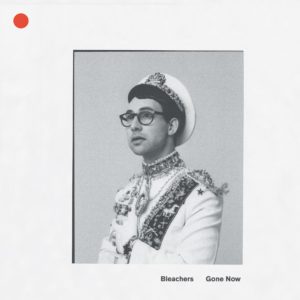Review: Bleachers – ‘Gone Now’
Posted: by admin

Jack Antonoff is nothing if not deliberate in his approach to music. People often trash talk Antonoff’s work for a reason I can’t seem to understand, but the fact is, as a producer and a songwriter he helped bring to fruition hits that are almost universally loved by artists like Lorde, Carly Rae Jepsen, fun. and Taylor Swift. And with his second solo album as Bleachers, Gone Now, he’s taken his capacity for knife-sharp production to a new height. Gone Now is grand and honest in both sound and style. That may sound pretentious, but Antonoff has been called that for both his sound and the way he presents himself—maybe pretentiousness is okay here. Pretension is often a prerequisite when we talk about music, because to get something to sell, people have to be convinced of its worth, even to the point of overselling. This record is personal in its sound and promotion in a way that pop music often fears. There’s something real and genuine and visceral about Jack Antonoff’s music, especially Gone Now.
As one would expect from the producer of multiple critically acclaimed albums, the production is impeccable, from the crisp, raw vocals in “Goodmorning” to the well-worked electronic spin in “I’m Ready To Move On/Mickey Mantle Reprise.” The explosive beats accurately complement the huge display of raw emotion on this album. I’m inclined to call Gone Now a pop album purely because it is saturated with soaring hooks. But content-wise, it talks about anxiety in relationships and is self-reflective in a way that pop music is usually not. Like a pop album, it’s full of guest features—“Don’t Take the Money” and “Hate That You Know Me” include vocals from superstars Ella Yelich O’Connor (Lorde) and Carly Rae Jepsen, respectively—but unlike pop, both both songs unearth jagged, unpolished emotions in their content.
“Dream of Mickey Mantle,” the first track on Gone Now, introduces the following songs in sly Jack Antonoff fashion with lyrics like “I miss those days / so I sang you ‘Don’t Take the Money’ song.” “I Miss Those Days” utilizes deep bells and features grounded saxaphone parts as Antonoff sings about the growth he experienced during his first tour in a band, after his sister’s death. Every song on Gone Now is uniquely thought-provoking, from the authenticity in the lyrics to the thoughtful use of diverse sounds, some that often go underplayed in pop music.
One piece of criticism I have for this release is that the singles Antonoff chose for press purposes simply do not do the album justice. “Don’t Take the Money,” “Everybody Lost Somebody,” and “Hate That You Know Me” don’t hold a candle to other tracks on Gone Now. This record is one about heartbreak, about working to balance the fantasy aspect of love and the difficult reality of relationships. The most moving songs on Gone Now are the ones that don’t hold back in their size and scale when exploring these topics. Those singles also for the most part don’t include the motifs utilized on the rest of the album. These motifs (lyrics, note patterns, beats, etc.) are used more effectively and entertainingly than any I’ve heard on a pop record in recent memory. They’re not redundant the way the first Bleachers album, Strange Desire, sometimes becomes. The symbols and pointed lyrics are knitted throughout Gone Now in a way that allows the listener to soak everything in during the first listen, while still leaving room to focus on something different on each later return to the record.
One of the less confident aspects of this record is song order; it doesn’t follow a traditional arc. However, there’s a certain symmetry in the placement of tracks like “Goodmorning” and “Goodbye,” and the exploration of topics like infatuation and loss (“Nothing Is U,” “Everybody Lost Somebody”). On Gone Now, every song sounds like it could be the crashing first track and the diving album closer: from the “rolling thunder” on “Goodmorning” to the almost hip-hop-esque repeated stanza on “Goodbye:” “goodbye/to the friends I’ve had/goodbye/to my upstairs neighbor/goodbye to the kids downstairs/anybody who lent me a favor.” More than one of the tracks start with fuzzy spoken word parts whose lack of explicit context brings to mind the universality of the emotions expressed on the album, be they positive or negative: love, anxiety, grief. Overall, the story Gone Now tells is difficult to follow at times, much because Antonoff’s message is sent not through lyrics, but through the sounds he uses to invoke certain emotions and reactions in the listener.
There’s no way I could get through a review of this album without mentioning Antonoff’s unique creative endeavor that was part album promotion, and part genuine musical innovation. We live in an age where music is often not just in an album—musical creations are visual booklets, music videos, short films, coloring books, and more. For Jack Antonoff, Gone Now is a bedroom, his childhood bedroom complete with 27 years’ worth of band posters, instruments, vinyl records, books, and more. Antonoff has been transparent about how personal an album Gone Now is. It comes from pain and loss and fear, and according to Antonoff, it’s inextricably tied to the room in which its contents were inspired. Thus, he has actually, physically, removed his bedroom from his parents’ house and is taking it on tour with him, so that fans can explore the setting where Gone Now was born. It’s undeniably brave for a public figure to bare such a personal part of themselves so explicitly. Critics have called the effort pretentiou, but the same could be said about me for writing this review and you for reading it. In both cases it’s a deeper exploration of a piece of art, placing it in a specific context. Antonoff may come across as too self-important at times, but in the process he’s digging into some importantly personal art, and showing listeners he really cares. I think it’s worth it.
Gone Now is moving. Maybe Antonoff is that exceptionally talented. Maybe it’s just that, as a producer and songwriter of pop music, Antonoff has learned just which nerve to hit psychologically to make listeners shed a tear or want to dance. But either way, this record has myself (and the press) under the spell of Bleachers. It feels like your favorite song from your childhood, the album you always knew all the lyrics to. It feels like a car ride home in the dark or dancing at midnight in your dorm room after getting back from a party. It could easily be the soundtrack to an 80s movie when the main character runs down the street in the rain, shouting in joyful victory. It contains the joy of your dad’s favorite album, the sadness of that one song that makes your mom cry and the enormity that makes your sister roll her eyes. And maybe this is all in my head, but maybe it’s so much more. Gone Now is a mirror.
Didn’t that sound pretentious? Probably. But wasn’t it also so pretty? Yeah. Well, that’s what Gone Now is like.
Score: 8.7/10
—
Lucy Danger










